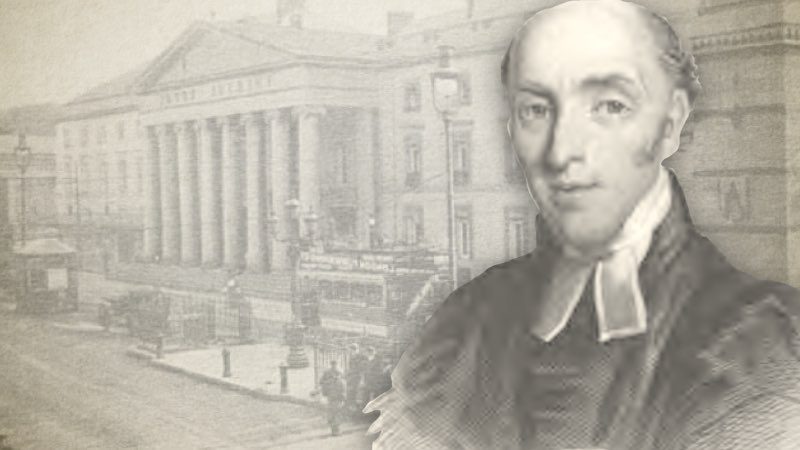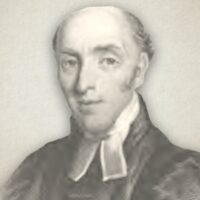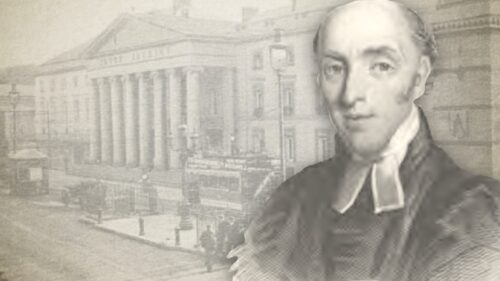
The Life And Ministry Of George Godden
Gospel Magazine 1852:
To The Editor Of The Gospel Magazine
My Dear Brother,—Your kind request to Mrs. Densham has been sent by her to me, as the friend of our deceased and highly-esteemed brother, the Rev. G. H. Godden; and now, in accordance with her request and yours, I have forwarded to you by this day’s post, a brief but but very imperfect sketch of this distinguished and honored servant of the Lord.
He left behind him three volumes of his Diary, which indeed are invaluable for their sound Divinity, so rare in this time-serving age, and for the high tone of Scriptural piety they present, and also the sweet testimony of the Person and ministry of the Holy Ghost in a rich Christian experience. These he requested might be forwarded to you to make any extracts, or dispose of them as you thought proper. Perhaps you would be so kind as to grant them to his afflicted widow, after you have done with them, as she very highly prizes them.
You will be kind enough to intimate your intentions, and the best mode of forwarding them to you, at your earliest convenience. With prayers for the prosperity of your ministry, and success of your editorial labours, I remain,
Your unworthy friend and fellow-laborer in the Lord’s vineyard,
John Webster
Stonehouse, Plymouth, Devon, April 16, 1852
—————————
Our dear friend and brother, George Harry Godden, for seventeen years minister of Corpus Christi Chapel, Stonehouse, near Plymouth, Devon, fell asleep in Jesus, April 3rd, at a quarter to eight p.m., and was interred in the family vault in the New Cemetery, Plymouth, on the Thursday following, at noon, attended by numbers of his sorrowing friends and former hearers. He was valiant for the truth, delighting in a full, free, and finished salvation, as revealing the electing love of Jehovah the Father, the Headship of the co-equal Son, and the Person and ministry of God the Holy Ghost. He sought to abase the creature, and lift up the Saviour as all in all. Thus his trumpet gave no uncertain sound, for he was determined to know nothing among men save Christ, and Him crucified. Thus the ministry of our dear brother was sound in doctrine, deep and rich in experience, and practical—not for, but resulting from, life in the Lord’s children, as predestinated to be conformed to the image of His Son. In his life and ministry he was a witness for God. He was indeed a bright and shining light; and oft has my soul been refreshed by his spiritual conversation. Indeed, to me, the loss, after an uninterrupted friendship of twelve years, is severely felt.
His natural birth was on the 17th of July, 1795; his second birth was in the year 1827, on board the “Queen Charlotte,” then flag-ship at Portsmouth. It pleased the Lord to send a dreadful tempest, which prevented his going on shore that night. Retiring to his cabin, he took up a book by Romaine, left by a Christian friend for his perusal, which he had determined to return unread; but the Lord had otherwise appointed. He hardly began, when the Lord the Spirit fastened conviction upon his soul, which found no relief until, by this unerring guide, he was led to the cross, and felt the love of God shed abroad in his heart by the Holy Ghost. As the law-work was deep, so the revelation of pardon through the blood of Jesus, was joyous. From this time he determined to abandon a service so unfriendly to spirituality, and retired upon a lieutenant’s half-pay, when the prospect of promotion was before him and certain—thus proving the sincerity of his faith to leave all and follow Jesus. He used often to say that he held two commissions, but would readily abandon the former, if it in any way interfered with the latter. About a year after this, he began, in a village near Portsea,
“To tell to sinners round,
What a dear Saviour he had found.”
One of his first texts (1 John 1:7, last clause,) was much blessed, as appears by a letter in his Diary, written by one of the hearers. On removing to Plymouth, he enjoyed the friendship and ministry of the Rev. John Hawker; but a congregation having been formed, and the chapel built, he eventually became their minister, the Holy Ghost bearing testimony in the hearts of God’s children, by the conversion of many, the restoration, bringing into the liberty of the gospel, and building up of those who had believed through grace. Here he continued to labour with much success, and respected by all who knew him, until about three years since, he was severely afflicted, but continued, when able, to minister the word, to preach; but twelve months after, resigned, there appearing no prospect of his recovery. It devolved upon me to read his letter of resignation, since published in the “‘Gospel Magazine,” and preach the farewell sermon from 2 Tim. 4:6 -8. It was a solemn and affecting season. For two years he was waiting for his crown, longing, to depart and to be with Christ. During this protracted illness, he was resigned, deploring most of all the loss of ordinances and inability to preach. Considering himself as a cumberer of the ground, fearful of being confined to bed, and becoming impatient, he entreated of the Lord to spare him this trial, which was graciously granted. The day before his departure, he spent the evening with one of his spiritual children, read the first chapter of the first of Peter, and engaged in prayer with great fervour; the next day dined as usual, but in the afternoon was uneasy. After asking audibly questions to himself, and answering generally with “Yea, Lord,” or “Lord, thou knowest.” “Am I a child of God?”‘ “Am I born again?” “Am I an hypocrite?” to this last question he answered, “No, Lord; a sinner saved by grace.” At six, he took his tea, became restless, and exclaimed, “Can this be death?” and exclaimed, with a firm voice, “Though I walk through the valley of the shadow of death, I will fear no evil; thou art with me, blessed Jesus, and then I fear not,” which was his last testimony on earth.
After a short interval of unconsciousness, he fell asleep in Jesus without a groan or struggle. So such was the closing scene of our dear brother, who, with his brethren, Borrows and Irons, departed the same day to join in the praises of Him who loved them, and gave Himself for them; washed their robes in His own blood, made them kings and priests unto God, and brought them off more than conquerors.” Blessed are the dead which die in the Lord from henceforth; Yea, saith the Spirit, that they may rest from their labours; and their works do follow them” (Rev. 14:13).
Yours in the bonds of covenant love,
John Webster,
April 16th, 1852
Minister of Ebenezer Chapel, Stonehouse, Plymouth, Devon.
George Godden (1795-1852) was an Independent sovereign grace preacher. For seventeen years he served as pastor for the church meeting at Corpus Christi Chapel, Stonehouse, Plymouth, Devon. He was a frequent contributor to the Gospel Magazine.




